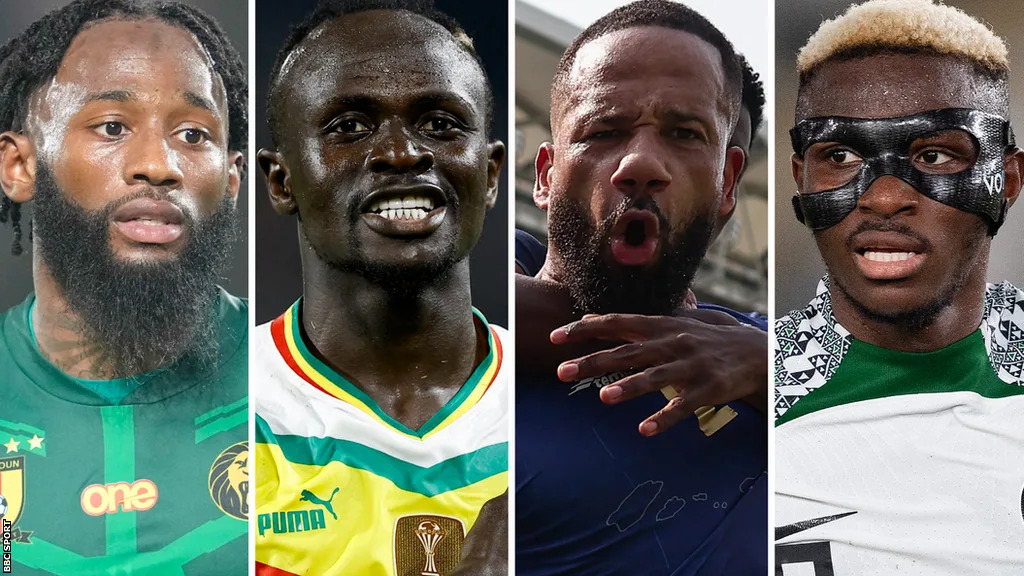What to look out for in the last 16 with Senegal, Nigeria and Egypt among hopefuls

After some unexpected results in the group stage, there will be some heavyweight ties to look forward to when the last-16 stage at the 2023 Africa Cup of Nations (Afcon) starts on Saturday.
(Left to right) Cameroon winger Georges-Kevin N'Koudou, Senegal forward Sadio Mane, Cape Verde midfielder Bebe and Nigeria striker Victor Osimhen are all targeting victory in the 2023 Afcon round of 16.
Hosts Ivory Coast snuck through as a third-placed side and will now come up against holders Senegal, who were the only team to progress with maximum points.
Meanwhile, five-time continental champions Cameroon will face three-time winners Nigeria in another mouth-watering encounter.
Both of those games will be televised by the BBC (UK only) but the other six knockout matches hold strong potential for more unpredictable drama.
BBC Sport Africa previews what could be about to unfold in eight games from Bouake to Yamoussoukro.
Southern African clash precedes the big names
The first last-16 match feels a fitting opener, pitting the two lowest-ranked teams remaining against each other as Angola meet Namibia (Saturday, 17:00 GMT).
Both confounded expectations, with Angola topping Group D unbeaten and Namibia qualifying as one of the best third-placed teams.
That was largely by virtue of their sensational opening victory over Tunisia, which was the Brave Warriors' first win in their 10th game at the finals.
"Everything happening on that field is not a surprise. Maybe for everybody else, but I am the orchestra with my team," Namibia coach Collin Benjamin said.
Namibia boast the dangerous forward pairing of Deon Hotto and Peter Shalulile, while Mabululu and Gelson Dala both have two goals for Angola - with the latter also setting up five chances.
-
Angola out to prove Afcon critics wrong
Nigeria against Cameroon, later on Saturday (20:00 GMT), is a far more familiar knockout fixture.
The countries have contested three finals, in 1984, 1988 and 2000, with all of those games won by the Central Africans - the most recent of them on penalties after a 2-2 draw.
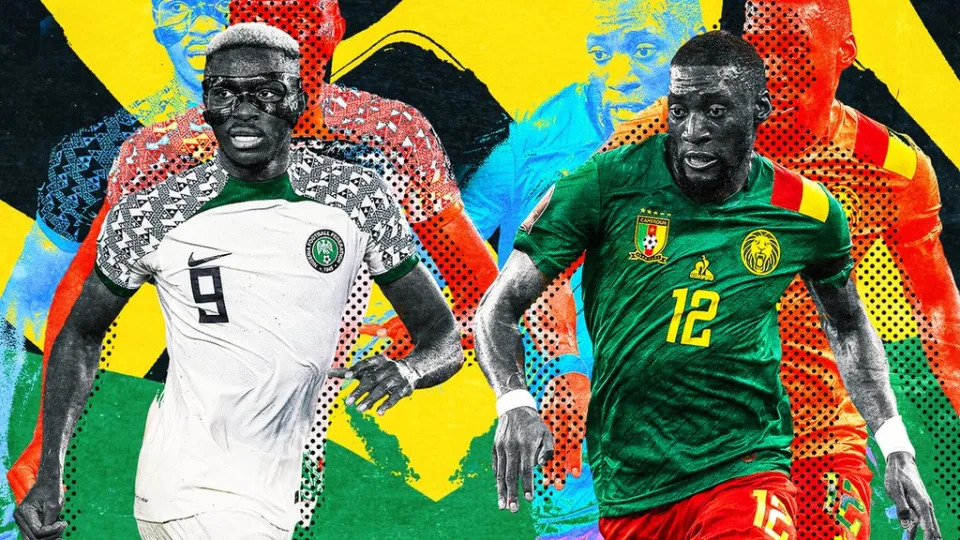
Nigeria, who are unbeaten, may need striker Victor Osimhen to be at his best after the African Footballer of the Year's 13 attempts and four chances created was the most on record by a Nigeria player in the group stage.
Georges-Kevin N'Koudou is equally influential for Cameroon, setting up 10 chances - the most of anyone at the tournament.
Plenty of attention has been on who has been in goal for the Indomitable Lions, with Manchester United keeper Andre Onana missing their opener, playing their second game and then being dropped for their dramatic Group C decider against The Gambia.
"I have no problem with my goalkeepers. There is no controversy," said Cameroon boss Rigobert Song.
Nsue inspires as Egypt stutter
With the big stars failing to find the net in Ivory Coast, can unexpected top scorer Emilio Nsue continue his prolific form when Equatorial Guinea face Guinea on Sunday (17:00 GMT)?
Nsue became the first player in 16 years to score an Afcon hat-trick in his country's 4-2 win over Guinea-Bissau and added two more to almost knock Ivory Coast out.
Underestimate the Equatoguineans at your peril - the National Thunder have reached at least the quarter-finals in their previous three appearances at the finals.
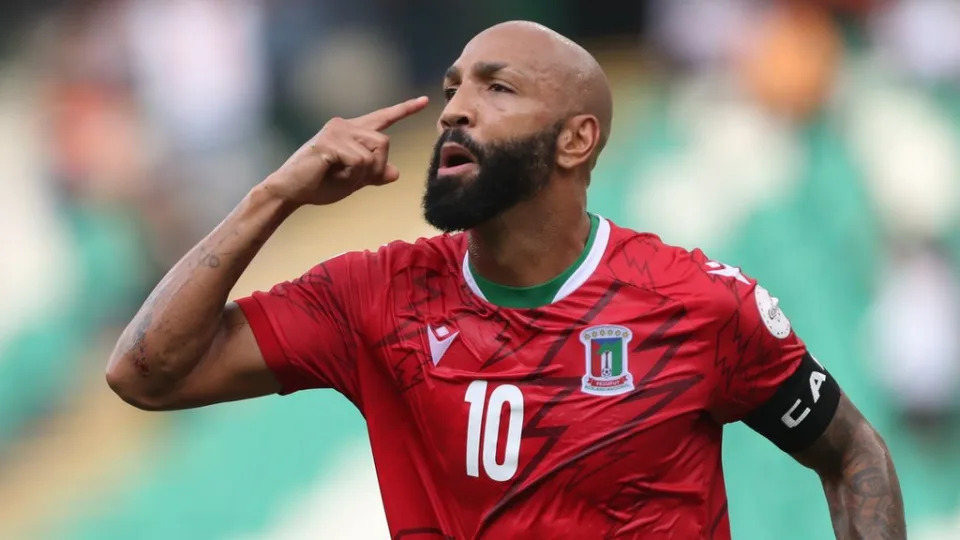
Guinea are also impressively consistent, advancing to the last 16 for a fourth consecutive tournament, but of the teams remaining only Namibia have scored fewer than the two goals Syli Nationale have netted.
Talk of injured captain Mohamed Salah could loom large when Egypt play DR Congo (Sunday, 20:00 GMT) but the absence of the Liverpool star may not be the key concern for the squad he has left behind.
Of the teams still involved, the record seven-time winners are top of the charts at Afcon 2023 for turnovers high up the pitch (25) and sequences of more than 10 passes (40), while Mostafa Mohamed has scored in each of their three 2-2 draws, making him the tournament's second-top scorer.
Despite those encouraging figures, Egypt seemed vulnerable against Mozambique, Ghana and Cape Verde in the group stage, and are expected to be missing Emam Ashour, who has impressed with his composed displays, after the midfielder suffered a concussion in training this week.
A win for DR Congo, who also progressed with three draws, is the biggest possible last-16 upset according to Fifa's rankings, which put the teams 34 places apart.
Ivory Coast have second chance while Mauritania make history
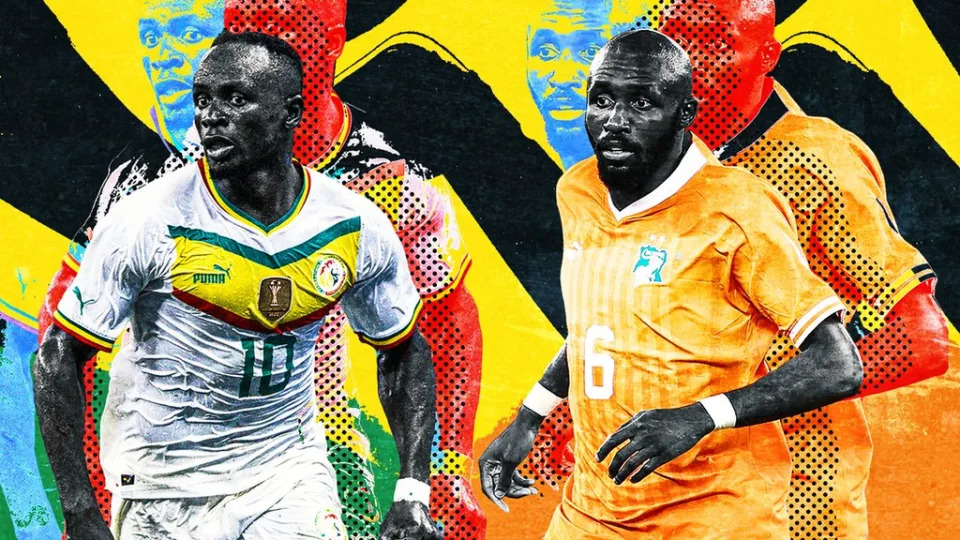
Minnows Mauritania take on Cape Verde (Monday, 17:00 GMT) as their reward for shocking 2019 champions Algeria to register their first-ever win at the finals.
The Lions of Chinguetti are the only team with a less than 1% chance of lifting the title, according to stats experts Opta. Coach Amir Abdou has emulated the success he achieved in taking Comoros to the last 16 in 2021.
"It's extraordinary what we are experiencing. I told the players that they wrote the history of Mauritania," said Abdou.
Another upset would be made all the more impressive by Cape Verde's form, beating Ghana and Mozambique and taking the lead in a draw with Egypt on their way to winning Group B by four clear points.
The islanders have made the last 16 for the second consecutive tournament, but coach Bubista is looking further ahead.
"In our first team meeting I said to the players the objective was to get to the semi-finals," he said.
After breezing through the knockout stage, defending champions Senegal play Ivory Coast (Monday, 20:00 GMT) hoping for a repeat of the three successive two-goal wins the Teranga Lions enjoyed between the round of 16 and final in 2021.
Following humiliation by Equatorial Guinea in their final Group A outing, the hosts sacked Jean-Louis Gasset before their progress was confirmed.
The Elephants then failed in an audacious bid to secure the services of Herve Renard, their 2015 title-winning coach, and interim coach Emerse Fae will need to reinvigorate Ivory Coast against daunting opponents.
West African clash and Morocco aim to realise potential
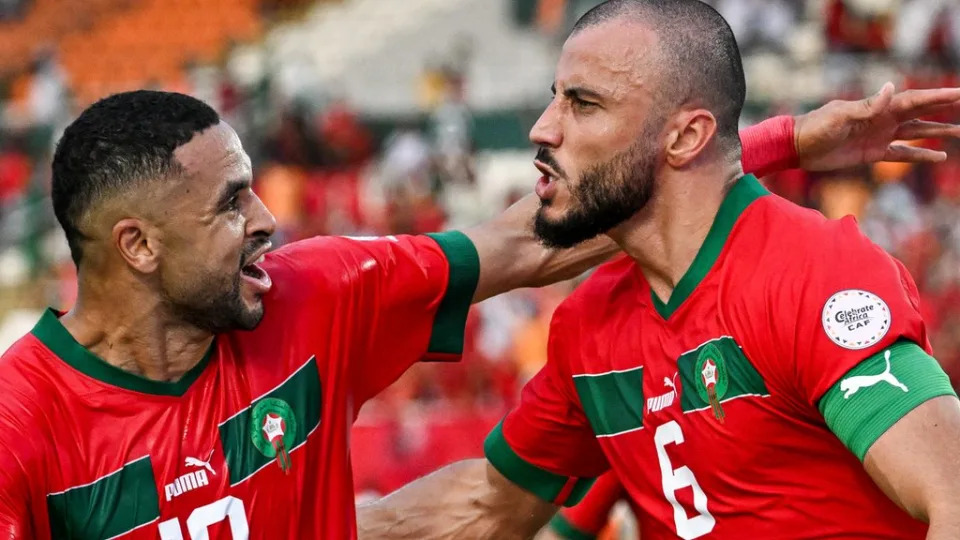
On Tuesday, two sides tipped as dark horses for the title meet when Mali face Burkina Faso (17:00 GMT).
The Eagles extended their unbeaten group-stage record to 10 games across four tournaments, but Eric Chelle's side produced only three shots on target across their draws with Tunisia and Namibia.
Burkina Faso signed off the group stage with a 2-0 defeat by Angola, finishing second to secure a shot at repeating their runs to the final in 2013 and the semi-finals in 2017 and 2021.
Their task now is to improve their recent record of eight losses in 10 matches against Mali, including a 3-1 defeat in the group stage at the 2004 Afcon finals.
Morocco coach Walid Regragui is set to be back in the technical area to see the Atlas Lions play South Africa (Tuesday, 20:00 GMT) after having a touchline ban overturned on appeal.
Achraf Hakimi and Hakim Ziyech will attempt to trouble a defence on a run of two successive clean sheets.
South Africa thrashed Namibia 4-0 in their second game - their largest-ever Afcon win - and can draw on their 2-1 victory over Morocco in qualifying as Hugo Broos aims to mastermind an upset against the continent's top-ranked side.
No southern African (Cosafa) team has reached the Afcon final since Zambia's surprise win in 2012. While Angola or Namibia are assured of a quarter-final place, Bafana Bafana face a sterner test standing in the way of their dreams of repeating their 1996 glory.
How China's 'stadium diplomacy' is looking to make its mark at the Africa Cup of Nations
China may have left the Asian Cup early after its men's football team was eliminated in the first round, but is making its presence felt on another continent - at the 34th Africa Cup of Nations.
The recent visit to Ivory Coast by Chinese Foreign Minister Wang Yi coincided with the early stages of the football tournament also known as Afcon, being held in the West African country with three Chinese-built stadiums among the six venues.
These include the 60,000-seat Alassane Ouattara Stadium north of Abidjan, also known as the Olympic Stadium of Ebimpe.
It is Ivory Coast's largest stadium and was financed by US$40.6 million from the China International Development Cooperation Agency or China Aid - Beijing's official foreign aid and global development agency.

Chinese Foreign Minister Wang Yi with Ivorian President Alassane Ouattara in Abidjan earlier this month. Photo: Reuters alt=Chinese Foreign Minister Wang Yi with Ivorian President Alassane Ouattara in Abidjan earlier this month. Photo: Reuters>
There is also the US$107.5 million Laurent Pokou Stadium in San Pedro, funded by the Industrial and Commercial Bank of China.
Building stadiums is part of a wider long-term plan by China to boost ties with African countries by funding large-scale infrastructure projects such as diplomatic and military education facilities, presidential palaces, parliament buildings, hospitals and foreign ministry headquarters.
According to China's nationalist tabloid Global Times, the country has built more than 100 stadiums across Africa.
"All of this is part of a long-term policy of 'stadium diplomacy' which China has been deploying across the continent," Simon Chadwick, a professor of sport and geopolitical economy at SKEMA Business School in France, and Chris Toronyi, a PhD candidate and lecturer at Loughborough University in Britain, wrote in news and commentary site The Conversation.
"Linked to the Belt and Road Initiative, which is intended to promote trade and foster interdependence between China and other nations, stadiums have frequently been gifted to African nations [or else paid for using relatively cheap loans]," they wrote in the January 2 article.
Paul Nantulya, a China specialist at the Africa Centre for Strategic Studies in Washington, said this was a useful way to build influence.
"It is a cost-effective way of generating political influence with different elites," Nantulya said.
However, he noted that most of the buildings, including diplomatic and military facilities, were "always included" as a "by-product" of larger construction and energy projects negotiated between Chinese entities and African governments.
"China is essentially benefiting from those economies of scale," Nantulya said.
Meeting President Alassane Ouattara in the economic capital Abidjan on January 17, Wang said the hosting of Afcon was "not only a grand event for the African people, but also the pride of Ivory Coast".
"The main stadium built with China's assistance for Ivory Coast was delivered on time and with high quality ... and has become a symbol of mutually beneficial cooperation between China and Ivory Coast and a symbol of China-Africa friendship," Wang said.
The Alassane Ouattara Stadium hosted Ivory Coast's three group matches, which included a win and two losses.
Meanwhile, Beijing is also trying to expand its soft influence beyond steel and concrete.
In Namibia, Tanzania and Zimbabwe, Chinese instructors not only regularly teach at military colleges Beijing has bankrolled and built, but also play a role in developing the curriculum.
In Tunisia, where Beijing has financed and built the Tunis International Diplomatic Academy, Chinese instructors are expected to work with local officials on diplomatic engagements and policy.
"It also comes with training, which I call the software aspect of it and that's where really the influence comes in," Nantulya said.
- Questions and Answers
- Opinion
- Story/Motivational/Inspiring
- Technology
- Art
- Causes
- Crafts
- Dance
- Drinks
- Film/Movie
- Fitness
- Food
- Giochi
- Gardening
- Health
- Home
- Literature
- Music
- Networking
- Altre informazioni
- Party
- Religion
- Shopping
- Sports
- Theater
- Wellness
- News
- Culture
- War machines and policy


